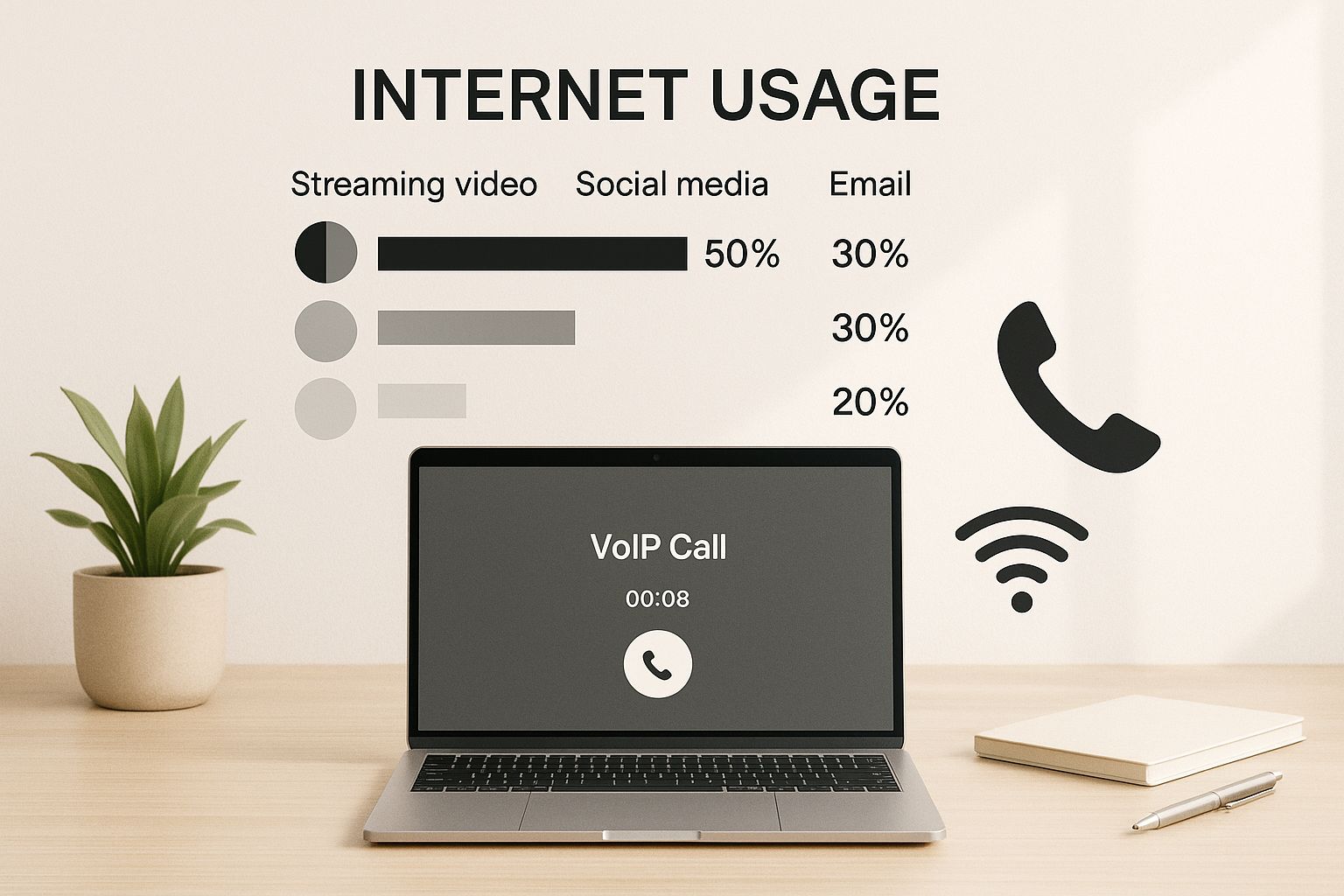Trying to run a modern business with a phone that’s literally tied to the wall is a losing game. For many small businesses, those old-school landlines mean high costs, missed calls, and absolutely no flexibility for a team that’s on the move. VoIP (Voice over Internet Protocol) solutions for small business cut that cord for good, turning your communication from a clunky utility into a powerful, flexible hub for your entire operation.
What Exactly Is a VoIP Phone System
Think of VoIP like this: it's the Netflix of phone systems. Instead of needing a physical copper wire running to your building, VoIP uses the internet connection you already have to handle all your calls. This simple but powerful shift opens up a world of possibilities that a traditional phone just can't touch.
It’s so much more than just a different kind of phone; it's a complete communication platform. It helps small businesses run more efficiently, sound more professional, and save a surprising amount of money—all without needing a dedicated IT department to manage it. Everything is typically handled through a simple online dashboard, giving you total control from anywhere.
The Core Technology Behind VoIP
So, how does it all work? The magic behind VoIP is a process that converts your voice into tiny digital packets of data. When you speak into your headset or phone, the system digitizes your voice, compresses it, and sends it across the internet. On the other end, those packets are instantly reassembled, and the person you're calling hears you in crystal-clear quality.
If you're curious to learn more about the mechanics, you can get a great overview of what an internet protocol phone system is and how the pieces fit together.
This visualization shows how VoIP uses your existing internet to create a flexible and powerful communication hub for your business.

As you can see, all you really need is a computer and an internet connection. Your business phone system becomes a portable, software-driven tool rather than a piece of hardware bolted to a desk.
The key takeaway is this: If you have a reliable internet connection, you already have the main ingredient for a superior phone system. This technology fundamentally changes the relationship between your business and its communications infrastructure.
Because the system is internet-based, you can access your business phone number from all sorts of devices. This includes:
- Desktop IP Phones: These look just like traditional desk phones but plug into your internet router instead of a phone jack.
- Softphones: This is just software for your computer that lets you make and take calls using a headset.
- Mobile Apps: Turn your personal smartphone into a secure business line with a simple app.
This versatility is a huge reason why so many businesses are finally ditching their old landlines. To see what a transition could look like for you, GT Computing offers a great breakdown of VoIP Phone Systems to get you started. This approach makes sure your team stays connected, whether they're in the office, at home, or on the road.
What's In It For You? The Real-World Benefits of VoIP
Switching to a VoIP system isn't just a minor tech upgrade; it’s a fundamental shift in how your small business communicates. Think of it less like getting a new phone and more like overhauling your entire communication engine to drive your business forward. For a small operation, the advantages are immediate and can give you the muscle to compete with the big guys.
Let's start with the most compelling reason for many: the cost savings. Traditional landline contracts feel like a relic from another era, locking you into steep monthly fees for a service that just doesn't do much. With VoIP solutions for small business, you're ditching the need for expensive physical phone lines and clunky hardware, which almost always means a healthier bottom line.

This isn't just about saving a few bucks here and there. Many businesses see their communication costs drop by as much as 75% after moving away from old-school phone systems. But the impact goes beyond your budget. Small and mid-sized companies also report a 30% jump in productivity. Why? Because the advanced features that come standard with VoIP make everyone more efficient and responsive. You can dig into more of these business VoIP trends to see where things are headed.
To really understand the shift, it helps to see a direct comparison.
Traditional Landline vs VoIP for Small Business
| Feature | Traditional Landline | VoIP Solution |
|---|---|---|
| Cost | High monthly fees, separate charges for long distance, and maintenance costs. | Lower monthly subscription fees, often with unlimited calling. |
| Hardware | Requires physical desk phones, PBX hardware, and dedicated wiring. | Works with existing computers, smartphones, or dedicated VoIP phones. Minimal hardware needed. |
| Flexibility | Tied to a physical location. A phone number is stuck to one desk. | Completely location-independent. Take calls on your mobile app, laptop, or desk phone anywhere. |
| Features | Basic features like caller ID and voicemail are often standard. Advanced features cost extra. | A rich suite of features like auto-attendant, call recording, and video conferencing are included. |
| Scalability | Adding a new line is a slow, manual process requiring a technician. | Add or remove users instantly through a simple online dashboard. Scales up or down in minutes. |
| Installation | Professional installation is usually required, adding time and expense. | Simple setup that can often be done by the user. Plug-and-play functionality. |
This table makes it pretty clear: VoIP isn’t just a cheaper alternative; it’s a more powerful and adaptable one in nearly every way that matters to a growing business.
Unlocking True Flexibility and Mobility
Beyond the cost, the real magic of VoIP is the freedom it gives you. Your team is no longer chained to their desks. An employee can have their business line ring directly on their smartphone through a mobile app or take calls on their laptop from a coffee shop.
This means you never have to worry about missed opportunities, whether a team member is:
- Working from a home office
- Traveling to meet a client
- Out on a job site
This kind of mobility ensures your business is always on and always professional. Customers get a seamless experience every time they call, no matter where your team happens to be.
Gaining a Professional Edge
VoIP completely levels the playing field. It gives small businesses access to the kind of sophisticated, enterprise-grade phone features that used to be reserved for massive corporations with deep pockets. These tools help you project a polished, trustworthy image from the very first interaction.
For a small business, sounding bigger than you are is a powerful advantage. Features like an auto-attendant or custom on-hold music instantly elevate your customer's perception of your company.
Think about it from your customer's perspective. When they call, instead of a simple ring, they're greeted by a virtual receptionist ("Press 1 for sales, Press 2 for support"). That one small detail makes your operation feel more established, organized, and credible.
Effortless Scalability for Growth
Finally, a VoIP system grows right alongside your business. Remember the old way? Hiring a new person meant calling the phone company, scheduling a technician, and waiting days (or weeks!) for a new line to be installed. With VoIP, adding a new user is as easy as logging into your online account and clicking a few buttons. It takes minutes.
This kind of effortless scalability means your communication system adapts to your business needs in real-time, without the usual friction, delays, or headaches.
Must-Have VoIP Features for Growing Businesses

When you start looking into VoIP solutions for small business, the list of features can feel a mile long. It's easy to get overwhelmed. But the truth is, you don't need every single bell and whistle. A few core functions deliver the biggest bang for your buck, turning your phone system from a simple utility into a powerful business tool.
First up is the Auto-Attendant. Think of it as a virtual receptionist that works around the clock, never takes a break, and always sounds professional. It’s the friendly, automated voice that greets callers and gives them a simple menu to get where they need to go—"Press 1 for Sales, Press 2 for Support." This one feature instantly makes your business sound bigger and more organized.
Then there’s Voicemail-to-Email, a huge time-saver. Instead of having to dial into a voicemail box and listen to messages one by one, this feature zips an audio file of the message right to your inbox. Many systems even include a text transcription, letting you scan the message in seconds to decide how urgent it is.
Essential Tools for a Mobile Workforce
Let's be honest, nobody is chained to a desk anymore. For any business with employees on the go, a dedicated Mobile App isn't just nice to have—it's a must. The app puts the full power of your office phone system onto each employee's smartphone.
This is a game-changer for a few key reasons:
- Professional Image: Your team will always be calling customers from your official business number, not their personal cell.
- Privacy: It keeps everyone's personal numbers private, creating a clear line between work and personal life.
- Work-Life Balance: Staff can set "business hours" within the app, so they aren't getting work calls during dinner.
The mobile app is what truly untethers your business from a physical location. It ensures your team stays connected and professional, whether they’re at the office, working from home, or out visiting a client.
Another critical piece of the puzzle is Call Forwarding. This is your safety net. If you're in a meeting or can't get to your phone, calls can be automatically sent to a colleague's line or your mobile. It's a simple function that makes sure a client or a hot lead never gets sent to a dead end.
Collaboration and Customer Communication
Modern VoIP is about so much more than just phone calls. Having Video Conferencing baked right into your phone system is incredibly useful. It lets you connect face-to-face with remote team members or give clients a product demo without having to juggle a separate app like Zoom or Teams.
Finally, don't sleep on Business SMS. More and more customers actually prefer to communicate via text for things like appointment reminders, quick questions, or status updates. Letting them text your main business number is a modern, convenient touch that can seriously improve their experience.
How to Choose the Right VoIP Provider
Picking the right VoIP provider is a huge decision. It's not just about getting a dial tone; the company you choose will directly affect your call quality, system reliability, and ultimately, how your customers experience your business. The goal is to find a true partner who gets what you need, not just the one with the slickest ads.
Before you even start looking at providers, take an honest look at your own business. Don't just think about making calls. How many people need a phone line today? What about in a year? Do you need your phone system to talk to your CRM and log calls automatically? Figuring this stuff out first gives you a clear checklist of what to look for.
Scrutinize Reliability and Support
When your phone is your business lifeline, you can't afford for it to go down. This is non-negotiable. Look for providers that offer a Service Level Agreement (SLA), which is their formal promise to you about service quality. You should be looking for a minimum guarantee of 99.9% uptime—anything less isn't worth considering.
Support is just as critical. When something inevitably goes wrong, you need to know you can get a real human on the line who can actually help. Check their support hours and see if they offer help by phone, chat, or email. For many smaller companies, having an IT pro handle all this is a game-changer. You can see how managed IT services for businesses can offer that kind of peace of mind.
Compare Pricing and Read the Fine Print
VoIP pricing isn't always straightforward, so you need to understand exactly what you're paying for. Most providers charge a per-user, per-month fee, but some offer tiered plans with a bundle of features. Get into the nitty-gritty. Is call recording standard, or is that an add-on? What about video conferencing? The little things add up.
The VoIP market is blowing up, expected to grow from $151.21 billion in 2024 to $236.25 billion by 2028. That means more competition, which is great for you. As you weigh your options, look at a few roundups of the top small business phone service providers to see how different companies stack up.
A provider’s transparency is a good indicator of their quality as a partner. If the pricing structure is confusing or full of hidden fees for basic features, it’s a major red flag.
By being methodical and asking the right questions, you can cut through the marketing fluff and find a VoIP provider that will genuinely help your business grow.
Getting Started with VoIP: What to Expect for Setup and Cost
When business owners hear "new phone system," they often brace for a massive, expensive project. But with modern VoIP solutions for small business, that couldn’t be further from the truth. Forget the days of complicated hardware and lengthy installations; today's cloud-based systems are built for a surprisingly quick and painless setup.
Getting started is often as simple as signing up on a provider's website, asking them to move your existing phone numbers over, and tweaking a few settings in a user-friendly dashboard. Seriously, if you can manage an email account, you have all the skills needed to run your new phone system. No dedicated IT staff required.
A Clear Look at the Costs
One of the biggest wins with VoIP is how straightforward the pricing is. Most providers use a simple monthly subscription model based on a flat fee for each person using the system.
That single monthly fee usually bundles everything you need to run your business communications, including:
- Unlimited calling within the country, so you’re not nickel-and-dimed for every minute.
- An auto-attendant (the "press 1 for sales" feature) to make you sound professional.
- Voicemail-to-email transcription, which is a huge time-saver.
- A mobile app, so your business line goes wherever you do.
The real magic is in the predictable, all-inclusive pricing. You get access to powerful communication tools that used to cost a fortune, all for a manageable monthly fee. It’s an incredibly smart investment for any small business.
Of course, you’ll want to check for any potential extras. Things like international calls, setting up a toll-free number, or buying fancy desk phones might add to your bill. But for the vast majority of small businesses, the standard plan has everything covered.
The One Thing You Absolutely Need
For VoIP to work its magic, you need one crucial thing: a solid internet connection. Think of your internet as the foundation of your house—if it’s shaky, everything built on top of it will be, too. If your connection is slow or unreliable, your call quality will take a hit.
The good news? Most business-grade internet plans are more than powerful enough to handle it.
The physical wiring of your network is just as important. To get a better sense of how an organized network can prevent issues like jitter and dropped calls, it’s helpful to understand what is structured cabling and why it matters. A stable connection is the secret to crystal-clear calls and a system you can count on.
What's Your Next Move?
Let's be real: VoIP isn't just some passing tech trend. It’s quickly becoming the standard for any business that wants to be smart, flexible, and ready for growth. Making the switch to a modern VoIP solution isn't just about saving some money—though you absolutely will. It’s about giving your team the freedom to work from anywhere and tapping into features that let you punch well above your weight class, competing with much larger companies.
If you're thinking this sounds complicated or expensive, you're not alone. But honestly, the transition is smoother and more affordable than most people think. Think of it as a strategic investment in where your business is headed. You’re building a communication foundation that can scale and adapt right along with you. It’s a move that makes you more efficient, more professional, and simply better equipped for whatever comes next.
Common Questions (And Straight Answers) About Business VoIP
Switching your phone system can feel like a big leap. It’s totally normal to have questions about downtime, how complicated it all is, and whether it’s even secure. Let’s clear the air and tackle some of the most common worries small business owners have when looking into VoIP solutions for small business.
The first question is almost always, "Can I keep my phone number?" The answer is a simple and emphatic yes. There's a regulated process called number porting that lets you transfer your existing business number from your old phone company to your new VoIP provider. For your customers, nothing changes—they'll never even know you switched.
What Happens if the Internet Goes Down? And Is It Secure?
This is a big one. What good is a phone system that relies on the internet if your connection is flaky? Modern VoIP systems have this figured out with automatic failover features. If your office internet cuts out, your calls are instantly rerouted to cell phones or another backup number you’ve chosen. You won't miss a beat, and more importantly, you won't miss a critical call.
Okay, so what about security? Are your calls just floating around on the internet for anyone to grab? Not at all. Reputable VoIP providers use powerful encryption, like Transport Layer Security (TLS) and Secure Real-time Transport Protocol (SRTP), to scramble your call data. It's the same kind of security that protects your credit card information when you buy something online.
Think of a quality VoIP provider as more than just a phone company—they're a partner invested in keeping your communications private and reliable. Their whole business is built on secure, high-availability infrastructure.
Do I Have to Buy All New Phones?
Many people picture a huge, upfront hardware cost when they think about upgrading their phones. The good news is, you've got options, and most of them don't require buying a fleet of expensive new desk phones (though you certainly can if you want!).
Your team can make and take calls using:
- Softphones: This is just a piece of software for a computer. Paired with a headset, it turns any laptop or desktop into a full-featured business phone.
- Mobile Apps: Most providers offer an app that puts your business line right on your employees' smartphones, keeping their personal numbers completely separate.
- Your Existing Phones: In many situations, a small device called an Analog Telephone Adapter (ATA) can connect your trusty old analog phones to your new VoIP service.
This kind of flexibility is a huge reason why VoIP has taken off. It lets you mix and match what works for your team and your budget. This adaptability is a key driver behind the addition of over 35 million VoIP business lines in the U.S. between 2010 and 2018 alone. You can learn more about the incredible growth of business VoIP and see why it's quickly becoming the go-to standard.
Keep your business running without IT headaches.
GT Computing provides fast, reliable support for both residential and business clients. Whether you need network setup, data recovery, or managed IT services, we help you stay secure and productive.
Contact us today for a free consultation.
Call 203-804-3053 or email Dave@gtcomputing.com



